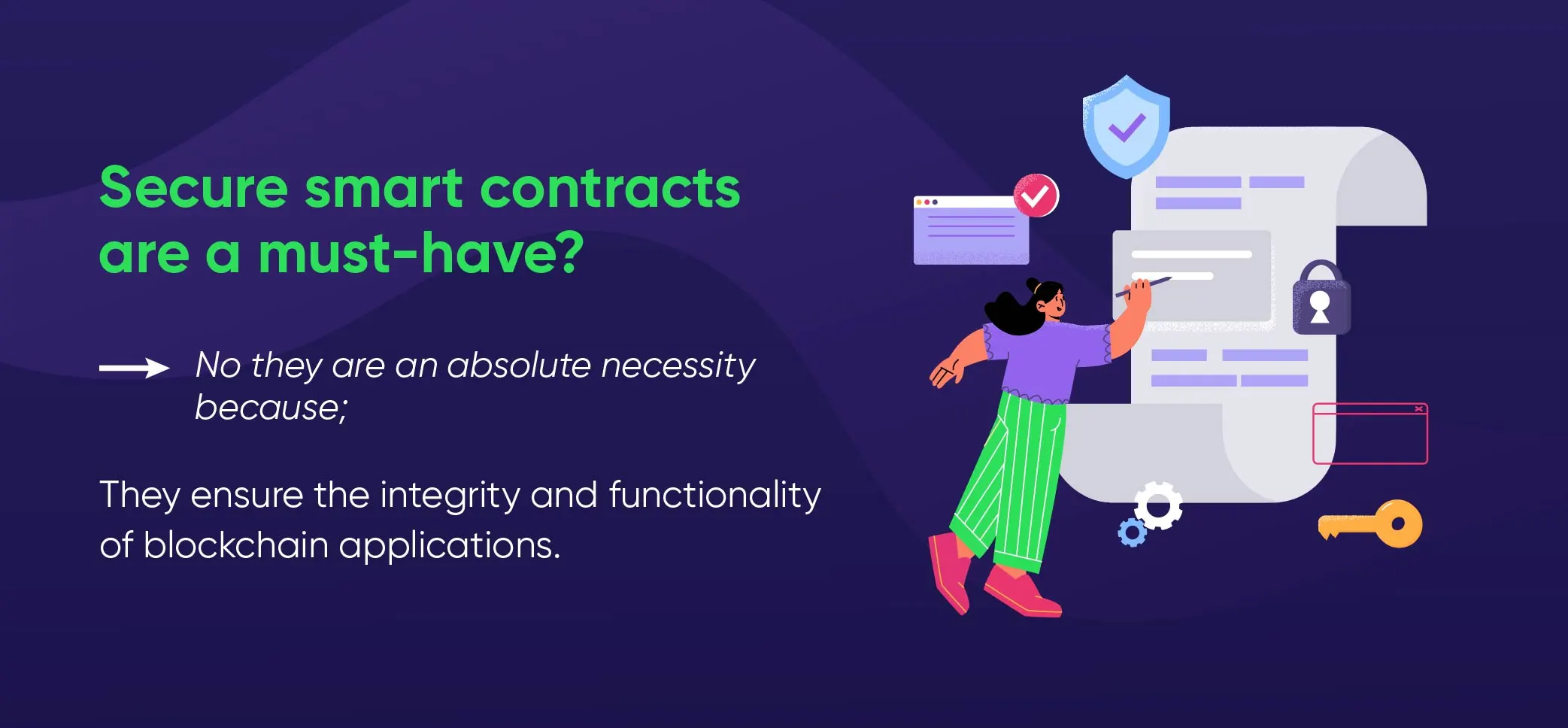
Introduction
Blockchain & Web3 Services Trusted By Leaders
- Develop innovative solutions using our state-of-the-art blockchain expertise.
- Achieve accelerated growth with robust & scalable Web3 consulting.
- Unlock 360-degree security with our top-rated blockchain development.
Smart Contract Security: A Comprehensive Guide
We are in a remarkable era of digital transformation, where the boundaries of finance and business are rapidly shifting towards two tenets: automation and decentralization. In addition, the adoption of smart contracts has transcended industry boundaries, extending its reach from the corridors of finance to the intricacies of supply chain management. This proves that: smart contract security isn’t a buzzword; it’s the backbone upon which the seamless integration and success of these automated, self-executing contracts rely. In this guide, we will delineate “What is Smart Contract Security,” and will also explore the role that secure smart contracts play in ensuring trust and integrity within a decentralized landscape. Before delving into it you should know about smart contract technology.Overview of Smart Contracts
- Self-executing agreements with terms that are directly written into code.
- Exist on blockchain platforms, ensuring transparency, security, and tamper-resistance.
Blockchain and smart contract technology
Blockchain and smart contract technology are directly proportional to each other.- Blockchain provides the decentralized, secure infrastructure on which smart contracts operate.
- The blockchain’s distributed ledger ensures that smart contract data is transparent, verifiable, and immune to tampering. In turn, smart contracts bring automation and efficiency to the blockchain, unlocking its full potential.
- Together, they are shaping the future of numerous industries and revolutionizing the way we conduct business.
Smart Contract Explained
A smart contract can be often imagined as a digital notary. We will explain this concept to you in simple terms;- Firstly, assume that you are buying a piece of digital art and instead of relying on a traditional notary, a smart contract will be used.
- Secondly, in this case, a digital contract will automatically transfer the ownership of the digital art to you once you make payment.
- Thirdly, the art’s ownership and the payment are all recorded securely on the blockchain.
- Lastly, if the payment isn’t made, the art remains with the seller. No intermediaries, no disputes – just a trustless, automated transaction.
Benefits of Smart Contracts
Smart contracts are not just code; they are transformative tools that are reshaping how we conduct business. Furthermore, The potential is vast as their benefits are becoming evident across multiple industries. Let’s look at some of the advantages that smart contracts bring to the table.- Efficiency: Automate processes, reducing the need for intermediaries and speeding up transactions.
- Transparency: The transparent nature of blockchain ensures that all parties can verify the terms and outcomes of a contract.
- Security: Smart contracts use cryptographic principles to provide a high level of trust and tamper resistance.
- Cost Reduction: By eliminating intermediaries, smart contracts reduce costs associated with traditional contract execution.
- Global Reach: Smart contracts are not bound by geographic borders, opening up opportunities for international business.
Smart Contract Hacks
“Smart Contract Hacks” are like hidden threats in the world of blockchain. In highly advanced systems, there are sure to be vulnerabilities and when they are exploited they can lead to a significant financial loss and also a loss of trust in blockchain technology. That is why smart contracts auditing services are important for any organization to remain safe and secure. For instance:- There’s a famous case known as “The DAO” incident.
- In this case, a vulnerability in a smart contract allowed hackers to steal millions of dollars worth of cryptocurrency.
- This event serves as a stark reminder of the need for rigorous security measures, including audits, testing, and ongoing vigilance to protect smart contracts from malicious attacks.
- It’s important that superheroes must remain vigilant to safeguard their city from threats. Similarly, smart contracts must be continuously secured to maintain the integrity of the digital realm.
The Significance of Smart Contract Security
Smart contracts play a primary part in blockchain applications for decentralized systems, driving automation, efficiency, and trust. However, the significance of smart contract security cannot be overstated. Organizations and enterprises across industries increasingly depend on these self-executing agreements because the need for security becomes really important to eliminate fraud.
How to Secure a Smart Contract
Smart contract security is a step that cannot be skipped and it is an aspect of blockchain applications. The responsibility of ensuring a secure smart contract falls on both developers and users. Let’s explore some tips and best practices for bolstering smart contract security;Code Auditing
- Conduct rigorous code audits to identify vulnerabilities, logical errors, and potential attack vectors.
- Engage professional auditors to perform thorough reviews of the smart contract code.
Testing
- Extensive testing and simulation is a vital step.
- Developers should run the contract in various scenarios to anticipate and address potential issues.
Use Proven Libraries
- Leverage well-established and audited smart contract libraries when possible.
- These libraries have undergone extensive testing and scrutiny.
Access Control
- Implement robust access control mechanisms to ensure that only authorized users can interact with the contract.
Upgradeability
- Plan for contract upgrades but do so with extreme caution.
- Implement well-defined processes and security checks when changing contract codes.
Emergency Procedures
- Prepare for worst-case scenarios with well-defined emergency procedures in case a security breach occurs.
The Future of Smart Contract Security
The future promises innovative solutions and advancements listed below;- Enhanced Auditing: Advanced auditing tools and practices will further streamline the process of identifying vulnerabilities.
- Privacy Solutions: Privacy-enhancing technologies will address confidentiality concerns within smart contracts.
- Formal Verification: The adoption of formal verification methods will become more widespread, ensuring mathematical proof of contract correctness.
- Layer-2 Solutions: Layer-2 scaling solutions will address scalability concerns while maintaining security.
- Interoperability: The ability for smart contracts to communicate and function seamlessly across different blockchains will bring new levels of flexibility.